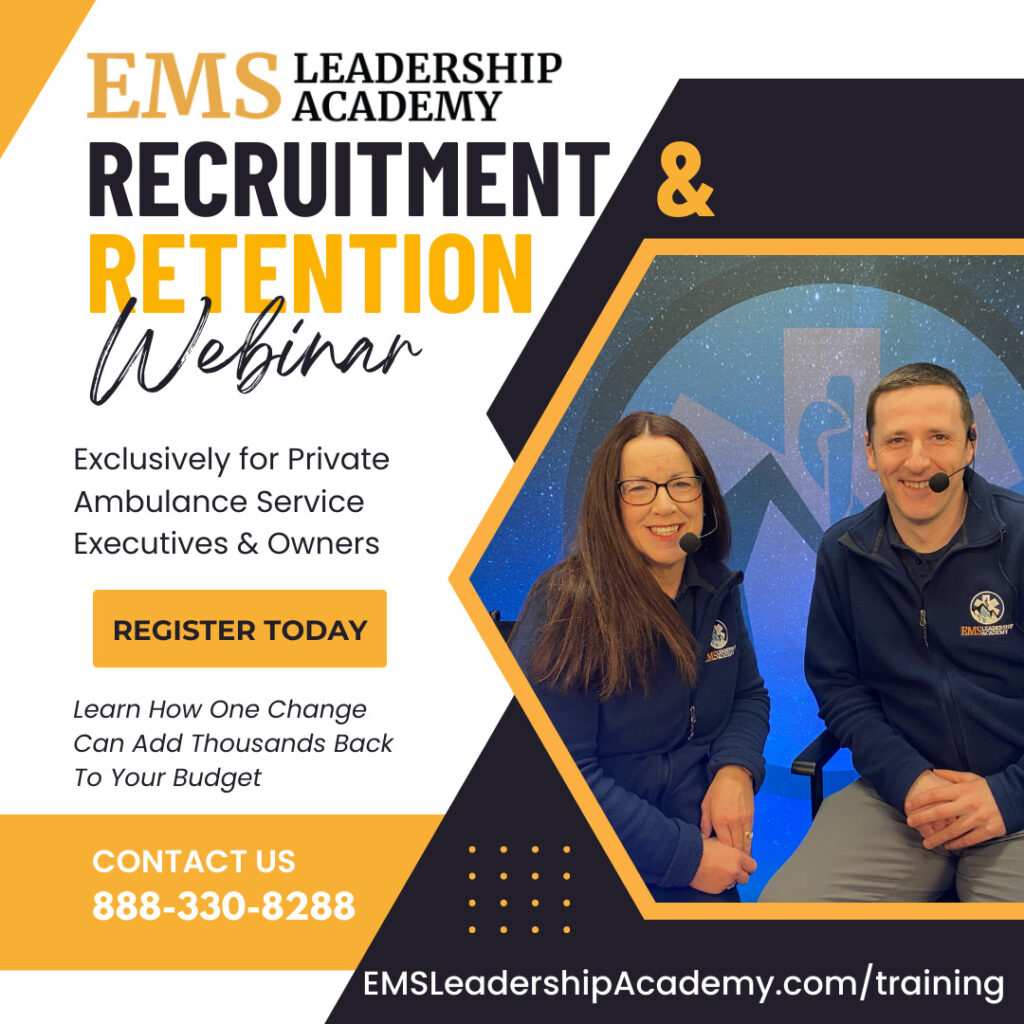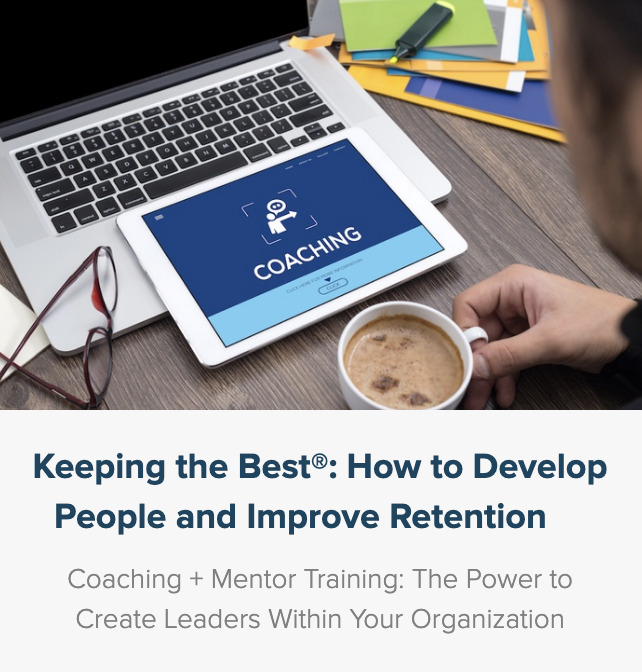- LISTEN to learn vs. listening to respond -- listen from a quiet mind vs from your opinions/right-wrong mentality. Neutral listening is key and your listening can influence people’s ability to speak
- An Appreciative Inquiry approach: Focus on what you want vs. what you don’t want. British Airways example of avoiding lost luggage vs. creating an exceptional arrival experience.
- Do you have a goal & vision big enough for inspiring enough to draw people towards? “In the absence of a great dream pettiness prevails” Robert Fritz
What can you do?
- Remember to plan and invest in the development of your people.
- Do you have a Human Resource department or a consultant to talk with if your organization isn’t big enough to have a HR dept?
Scott Moore is an excellent resource when it comes to Human Resources, employment law and policies in EMS. An EMT of 30+ years, and is a licensed attorney. www.MooreEMSConsulting.com - The EMS Leadership Academy offers an online Mini-course in communications, hosted trainings, or the annual EMS Leadership Summit.
- Visit our annual free EMS Leadership Summit, at www.EMSLeadershipSummit.com
Hello, and welcome to today's EMS leadership, Q and A I'm Lisa Giruzzi. And I am here with Robbie MacCue and we are the co-founders of the EMS leadership Academy. And for those of you that don't know, we help EMS leaders bring out the best in themselves and others. And today's question, Lisa is how do I deal with conflict and reduce controversy Again,
a fabulous question. And one of the most, I think, frequent ones that we hear when we do our live trainings and first and foremost, and it seems so simple, but the first thing really is to listen, but not listen in the sort of ordinary traditional way of listening. It's really about listening to learn versus listening to respond. You know,
w we've gotten into these habits of listening, but really it's it's so I can have a break. You know, when you, when you stop talking, I can actually tell you what I want to say versus listening to understand or listening to learn. I like to tell people, what have you listened to just from a quiet mind, you know, versus all the opinions and,
and, you know, judgments that you have, you know, you bring a neutral listening to the situation and, and it changes everything because you're focused on what the other person is saying. And then it allows them to really think differently because once they get out what they, what they feel they haven't been heard. And, and every one of us has had this experience.
So I'm saying they, but it's really all of us as human beings. Once we feel heard, it allows us the space to truly think, to truly have insights and discover something new. If we're listening through our opinions and judgments and yeah. Buts, there's no, there's, there's no ability to reduce controversy or, and conflict. And then I think it's really helpful if you help people to focus on what they want versus trying to avoid what they don't want.
And I, I know we use this example a lot, but I think it's so powerful in that British airways was at one time known as a luxury airline, but they had a terrible reputation because the problem with lost luggage, people would get to their destination and they would have, their luggage would be nowhere or they'd get home. And their luggage would be nowhere.
And that's what people would remember. You know, they they'd have this great experience on the, on the plane and then no luggage. So British airways got some consultants together and they, you know, were working on this issue and, and the morale of the 40 or 50 people that were in the room trying to figure out how do we solve this?
You know, the consultants just saw the energy going down down. And so then they said, look, we're trying to say what we don't want. What do we really want? What do we, what do we want our customers to have? And someone came up with the insight of what, about an extraordinary arrival experience. And everybody just came alive and they were like,
that's a great idea. And all of a sudden, they're like, we could do this and we could do that. And we could do this. And we could do that. And all this creativity, and they brainstormed all these ideas and they pick the top few that they were going to work on. And then they went down the list. And before,
you know, it, the last bag problems cease to exist because inside of creating an extraordinary arrival experience, it got handled. But we don't think that way, we think, Oh, if we stop the bags, then people will have X, you know, only working on what you don't want. Maybe you solve that problem, but typically you create more problems,
right? Unintended consequences. So what about if you could focus on what you want to create and come up with strategies and ideas and routines for that to happen, and then, then go from there. Absolutely. I love the example of what British airways did and how they really transformed the conversation from something that was just energy sucking. People would just probably want to avoid the conversation altogether or get frustrated at,
at how much luggage is lost versus like creating that exceptional arrival experience, that exceptional customer experience. What if we could create an exceptional patient experience and that, that would bring forth so much more creativity, energy, and engage people. And as we've said, many times before in the absence of a great dream pettiness prevails. So if you're dealing with conflict and controversy,
you probably don't have a vision or a goal big enough, or inspiring enough to draw people towards it. Yeah. And even individuals can really benefit from having their own, you know, visions and goals for who they are and who they want to create themselves as. And so that's, I think incumbent on us as leaders to help people to see themselves in a bigger context,
not just, you know, not just how they see themselves, maybe, you know, in a, in a way like, Oh, I'm just a member here rather than no, you're actually an influencer. You know, you're someone who people look up to cause sometimes people can't see that for themselves. And I think it's worth reiterating your first point around listening.
You and I talk about this in our training all the time. And we really dive into the ability of somebody to listen consciously, listen on a spectrum of conscious versus unconscious and how you as a listener can dial in your level of listening. So that it's so great. And that you can just deliver an immense amount of listening to somebody and that, that will influence their ability to speak and people will feel heard,
and it will change the relationship just by you listening to what they have to say without again, listening to reload or listening to like, what are you going to say in response to that? So I always love when you were able to bring up that point about listening. Yeah. And then some things really do need the expertise of HR, right. Human resources.
So, you know, there are conflicts or controversies that maybe w w you need the expert if human resources. And I think that's another important point. So, you know, I think the things we've talked about are critical, and sometimes it's important to bring in experts who know the ins and outs of you know, of the law around human resources. Absolutely.
And one of our industry experts is Scott Moore. He's been a speaker at the EMS leadership summit in the past. He's a phenomenal EMS provider, EMS leader, and attorney who focuses on HR law. And he even created a platform around employee feedback called Newton three 60. But Scott has just an excellent resource when it comes to human resources, law in EMS and policies concerning EMS.
So please feel free to reach out to Scott. And also another resource may be that people we always recommend is our mini course. You can access that communications mini course. And it's about four modules over a week. And people have had phenomenal feedback around their ability to communicate and listen Definitely helps with listening. And I highly recommend that. So thank you everyone for joining us for this session of our weekly Q and a,
we love doing these and we can only do them because people send us questions. So if you have a question to submit, please send it to us@supportatemsleadershipacademy.com or leave us a voicemail. We still have a toll free number (888) 330-8288. And again, thank you so much for joining us.



